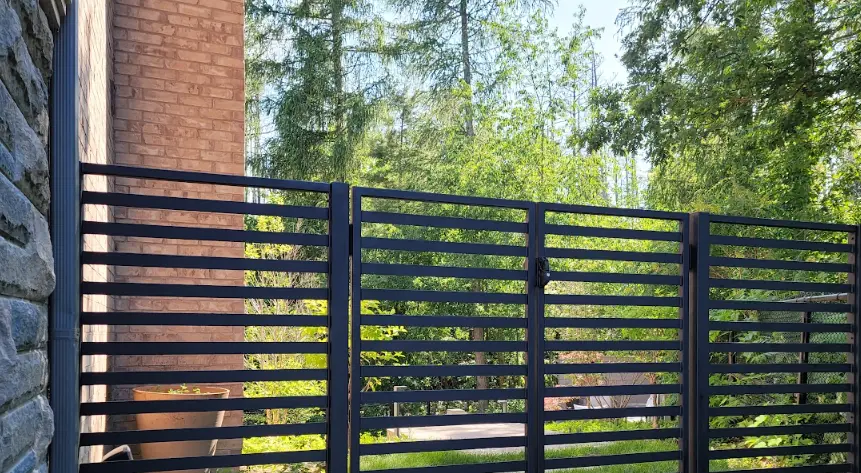Last Updated on June 16, 2025 by chanuka chanuka.23e2
Published: December 10, 2024
Choosing the perfect material for your gate is a decision that impacts its durability, functionality, and aesthetic appeal. Among the options available, stainless steel is often considered a top contender. But is it truly the best material for your gate? In this blog, we’ll explore the benefits, drawbacks, and ideal applications of stainless steel gates to help you decide if they’re the right fit for your property.
Key Takeaways
- Stainless steel gates offer unmatched durability, rust resistance, and a sleek modern appearance.
- While stainless steel is more expensive upfront, it delivers excellent value through longevity and low maintenance.
- Consider factors like climate, style, and budget when deciding if stainless steel is right for your gate.

What Makes Stainless Steel a Popular Choice?
Stainless steel has gained popularity for its combination of strength, aesthetics, and minimal upkeep. Its unique properties make it an ideal choice for gates in various environments, whether residential, commercial, or industrial.
Benefits of Stainless Steel Gates
1. Exceptional Durability
Stainless steel is one of the most durable materials available for gates. It resists warping, cracking, and general wear, even in high-traffic areas.
2. Rust and Corrosion Resistance
The chromium content in stainless steel forms a protective layer, making it resistant to rust and corrosion. This feature is especially valuable in humid or coastal regions.
3. Modern Aesthetic Appeal
Stainless steel gates have a sleek, polished appearance that complements contemporary architectural designs. Their clean lines and reflective surfaces create a sophisticated look.
4. Low Maintenance
Stainless steel requires minimal upkeep. Regular cleaning with water and a soft cloth is enough to keep it looking new, and there’s no need for frequent repainting or treatments.
5. Longevity
With proper care, stainless steel gates can last for decades without significant degradation, making them a cost-effective investment over time.
Potential Drawbacks of Stainless Steel Gates
While stainless steel has many advantages, it’s not without its challenges:
- Higher Initial Cost: Stainless steel is more expensive than materials like aluminum or mild steel, which might deter budget-conscious buyers.
- Weight: It is heavier than aluminum, which can make installation more complex and may require reinforced hardware.
- Style Limitations: While sleek and modern, stainless steel may not suit traditional or ornate designs as well as wrought iron.

Ideal Applications for Stainless Steel Gates
Residential Properties
Stainless steel gates are perfect for modern homes, offering a blend of security and aesthetics. They pair well with contemporary landscaping and sleek architectural features.
Commercial Spaces
Businesses benefit from stainless steel gates’ professional appearance and low maintenance, particularly in high-traffic areas like office entrances or parking facilities.
Coastal and Humid Environments
Stainless steel’s rust resistance makes it an excellent choice for properties near the coast or in areas with high humidity levels.
Comparing Stainless Steel to Other Materials
| Feature | Stainless Steel | Aluminum | Iron | Steel |
| Durability | High | Moderate | High | High |
| Rust Resistance | Excellent | Excellent | Low | Moderate |
| Aesthetics | Modern/Polished | Modern/Minimalist | Classic/Ornate | Versatile |
| Maintenance | Very Low | Low | High | Moderate |
| Cost | High | Low | High | Moderate |
Maintenance Tips for Stainless Steel Gates
- Clean Regularly: Use water and a soft cloth to remove dirt and debris. For stubborn stains, a mild detergent can be used.
- Inspect for Damage: Check for scratches or dents that might compromise the protective layer and address them promptly.
- Polish Occasionally: Restore shine with stainless steel polish to maintain its aesthetic appeal.
Conclusion
Stainless steel gates are an excellent choice for those seeking durability, minimal upkeep, and a modern aesthetic. While the higher upfront cost might seem daunting, the long-term benefits often outweigh the initial expense. If you value longevity, rust resistance, and sleek design, stainless steel might just be the best material for your gate.
FAQs
How long do stainless steel gates last?
Last Updated on June 16, 2025 by chanuka chanuka.23e2
With proper maintenance, stainless steel gates can last several decades without significant wear or corrosion.
Are stainless steel gates suitable for all climates?
Last Updated on June 16, 2025 by chanuka chanuka.23e2
Yes, stainless steel performs exceptionally well in all climates, particularly in humid or coastal areas where rust is a concern.
Can stainless steel gates be painted?
Last Updated on June 16, 2025 by chanuka chanuka.23e2
While stainless steel is typically used in its natural polished state, it can be painted with the right preparation and coatings. However, painting may reduce its low-maintenance appeal.
Is stainless steel heavier than other materials?
Last Updated on June 16, 2025 by chanuka chanuka.23e2
Yes, stainless steel is heavier than aluminum but comparable to steel and iron. Proper hardware and professional installation are recommended.
Are stainless steel gates customizable?
Last Updated on June 16, 2025 by chanuka chanuka.23e2
Stainless steel offers design flexibility but is best suited for modern and minimalist styles rather than intricate, ornate patterns.
Choose stainless steel if you’re looking for a sleek, durable, and low-maintenance solution that stands the test of time while adding value to your property.

 Chat
Chat 








